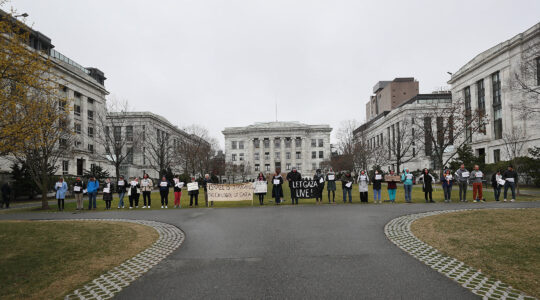WASHINGTON (JTA) — It was the forgotten issue of the general election campaign, with the two presidential candidates barely mentioning it last fall. And with so much focus on the economy, it seems to have receded even more into the background.
But Jewish groups aren’t letting that stop them from making a big push for comprehensive immigration reform.
Many major Jewish groups have signed on to two new initiatives in the past two weeks: a Jewish campaign aiming for “Progress by Pesach” on the immigration issue and the larger Interfaith Immigration Coalition working for the enactment of “humane and equitable” reform by the end of this year.
While Jewish groups are urging President Obama and Congress to take action, they are focusing much of their attention on education and advocacy efforts in local communities, hoping to see pressure bubble up to Washington from the grass roots.
Melanie Nezer, senior director for U.S. programs and advocacy at the Hebrew Immigrant Aid Society, said the key to success in immigration reform is for local activists to let local representatives know how important it is — and that’s already starting.
“In the last year we’ve really started hearing from local communities that this is something that needed to be done,” Nezer said. “We really have the grass roots pushing a lot of this.”
In particular, she said, the impact of immigration raids on local communities — such as the one last year on the Agriprocessors kosher meat plant in Postville, Iowa, which resulted in hundreds of arrests — have demonstrated “the fallout” from problematic immigration policies “in a very direct way.”
Postville-like raids are a prime motivator of the Progress by Pesach initiative, in which groups including HIAS, the Jewish Council for Public Affairs, the Anti-Defamation League, the American Jewish Committee, the National Council of Jewish Women, the Reform and Reconstructionist movements, and the Conservative movement’s Rabbinical Assembly have joined with a multitude of local organizations. Among their goals is to get Obama to issue an executive order or other directive to Immigration and Customs Enforcment curtailing the use of raids as a primary tool of immigration enforcement.
The organizations are aiming to collect 10,000 signatures by April 8, the first night of Passover, for a petition encouraging “humanitarian immigration reform” and decrying the “policy of relying on raids and enforcement tactics as the sole means of controlling immigration.” Visitors to the group’s Web site (www.hias.org/progress) also can send a letter to the president and members of Congress that contains similar language.
Coalition members argue that in addition to denying equal protection to those detained and splitting up families through jailing and deportations, the immigration raids also are expensive for the government and seriously impede businesses trying to make products in a poor economy.
Jane Ramsey, executive director of the Jewish Council on Urban Affairs in Chicago, says members of the coalition will be encouraged to publicize the online petition and letters at their activities and other Jewish community events.
Many of the same national organizations, along with others, including United Jewish Communities and B’nai B’rith International, are part of the Interfaith Immigration Coalition.
The coalition’s platform in favor of “humane and equitable” immigration reform by the end of 2009 includes upholding family unity as a priority, creating a process for undocumented immigrants to earn legal status and eventual citizenship, restoring due process protections and reforming detention policies, and aligning the enforcement of immigration laws with humanitarian values.
“Throughout history, the Jewish community has been the quintessential immigrant community, often forced to flee from land to land to land,” said the director of the Religious Action Center of Reform Judaism, Rabbi David Saperstein. “Having struggled to adjust to societies that did not welcome our arrival, we understand many of the challenges faced by today’s immigrants.”
Saperstein was scheduled to speak about the immigration issue to 700 students during Presidents’ Day Weekend at the National Federation of Temple Youth conference in Washington.
Rabbi Steve Gutow, executive director of the Jewish Council for Public Affairs, made the case for Jewish communal engagement on immigration issues by citing the Bible’s command that “we must love the stranger because we were once strangers in the land of Egypt.”
Nezer added that the Jewish community’s experience with terrorism gives Jewish organizations the credibility to point out that immigration reform is a national security issue as well. Setting up a system that allows undocumented workers to obtain citizenship is much safer than the current system, in which the government does not know the identities of millions of people in the country, she said.
Immigration reform efforts flopped in 2007 when President Bush failed in his bid to line up support from members of his own party. Many political observes asserted that Sen. John McCain’s backing of reform was a chief reason his primary campaign initially faltered before regaining momentum. But Jewish leaders on the immigration issue say the 2008 election returns may help to change the minds of GOP House and Senate members.
“A year-and-a-half ago, John McCain warned that if the Republican Party stayed with its position on immigration, they would lose the election,” Saperstein said, referring to anger from Latino voters. “He was right.”
As a result, Saperstein said, he expects the GOP to avoid making immigration a divisive issue. That change, along with Obama’s stated positions, Saperstein said, “give us reason for hope.”
JTA has documented Jewish history in real-time for over a century. Keep our journalism strong by joining us in supporting independent, award-winning reporting.





